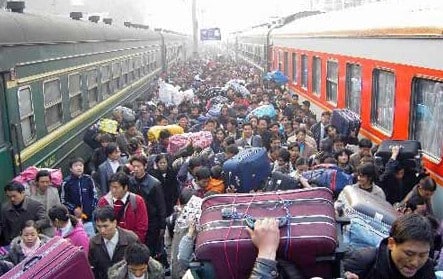My friend from Peking University invited me to spend the Spring Festival vacation at her home in Shanxi, a province in the northeastern part of China. Despite living in Beijing, I often find myself speaking English with my other expat friends. I wanted to be immersed in a Chinese environment and to experience an authentic Chinese New Year, so I was eager to have the opportunity to spend three weeks with my friend. When I arrived to the train station to meet her, I immediately noticed a difference in the way we packed. I was lugging my huge suitcase and oversized purse and she whizzed about with her pink and polka dotted mini suitcase. For a moment I wondered if we were really going on the same trip. Me, in my American fashion, looked as though I was moving homes and she, the efficient Chinese traveler, appeared as though she was simply going on an overnight trip. I regretted bringing such a cumbersome bag almost immediately, as I struggled to make my way past the thousands of passengers in the train station. I looked around to see if there were any other people who had packed in a similar fashion. Nope, just me. Some passengers had nothing more than a small duffle bag. Others only carried gift bags with special holiday foods. I was baffled. How was my friend going to survive the long holiday with barely any clothes? (Read the upcoming blogs on my Chinese New Year’s experience to learn the answer!)
I was a bit apprehensive about traveling on the train. I’ve heard horror stories of what it’s like to travel during Chinese New Year, the largest human migration in the world. I pictured cramped conditions, much like my bus experiences where people fill the space to maximum capacity to the point that the doors barely close. I imagined bad smells and filth. I even feared that I might lose my seat to a crafty standing passenger who managed to wedge himself over to my space. Fortunately, my fears were never realized. Standing passengers were at a minimum and the only pesky odor came from the guy who ate spicy noodles beside me.
At midnight, our seven hour journey to Shanxi was finally over. I didn’t know what to expect our living conditions to be like, but I had formed a rough idea based on my friend’s lifestyle in Beijing. She told me how she used shopping as therapy one day and purchased a Burberry scarf for 5,000 RMB ($800). She also proudly showed off the real Chanel earrings she had purchased just before leaving Beijing. I figured that someone who could afford such luxuries must be from a pretty well off family.
This proved to be a perfect example of why I should never make assumptions…
我的一个北京大学的朋友邀请我在她家度过春节假期,她家在山西,中国东北部的一个省。尽管生活在北京,我经常发现自己与其他外籍朋友讲英语。我想沉浸在一个中国的环境里,体验地道的中国新年,所以我非常渴望能有机会花3个星期与我的中国朋友在一起。当我到达火车站遇见她时,我立刻就注意到了我们打包的方式有所不同。我拖着我巨大的行李箱和超大的钱包,她只有粉红色的波尔卡点的小手提箱。有那么一刻,我怀疑,我们是不是真的要去同一个旅程。我在我的美国时尚里,带着看起来好像要搬家一样多的行李,而她是高效的中国游客,看起来好像她只是去一个过夜旅行。当我在火车站努力地穿梭在数千名乘客中时,我几乎立刻就后悔带来这样一个繁琐的包。我环顾四周,看看是否有任何其他人和我有一样的大背包。发现没有人这样,只有我。一些乘客拿着小得不能再小的行李袋。其他人只能拿着一些节日的食品礼品袋。我百思不得其解。我的朋友是如何在长假中生存的,难道不穿衣服吗? (请阅读我的即将发布的有关中国新年经验的博客学习答案!)
我有点担心上火车。我听说过的恐怖故事是在中国新年期间的旅行,那是世界上最大的人类迁徙。我想象拥挤的条件,就像我挤公交车的经验,人们充满整个空间, 车门几乎无法关闭。我想象难闻的气味和污物。我甚至担心,我可能会失去我的座位,让一个狡猾的站立乘客霸占我的空间。幸运的是,我的恐惧想象没有实现。站立的乘客很少,唯一讨厌的气味来自在我的身边吃辛辣面条的家伙。
午夜时分,我们到山西的7个小时车程终于结束了。我不知道我们接下来的生活条件是什么样的,但根据我朋友在北京的生活,我已经形成了一个粗略的想法,。她告诉我,她是如何用购物来治疗自己不好的心情,一天内花5000元人民币(800美元)购买了一条Burberry的围巾。她还骄傲地展示了她离开北京前刚刚购买的真正的香奈儿耳环。我想能买得起这样的奢侈品的人一定是从一个非常富裕的家庭。
事实证明,这是一个很好的例子告诉我永远不要有预先的假设…


